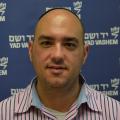Despite the still-standing global restrictions on travel, over the course of Holocaust Martyrs' and Heroes' Remembrance Day 2021, Yad Vashem, the World Holocaust Remembrance Center, reached hundreds of thousands of people around the world via its active social media and online presence. The responses to the content shared have not only been overwhelmingly positive and encouraging, they are representative of a relentless thirst for knowledge and inspiration in a fractured world.
Responding to a post about one of the six torchlighters chosen by Yad Vashem to light memorial flames at the Official State Opening ceremony, Joseph Cleveland Brown from the US and Belarus wrote the following response to a post about Yossi Chen:
"Although I am a Gentile, I am a student of the Holocaust, and have a special love for my Jewish brothers and sisters. I often visit memorial sights here and weep. We must prevent this from ever happening again!"
Kelly Showell from Canada commented on the post for Shmuel Naar, another of the six torchlighters at last night's ceremony.
"Despite all this man has lost, I see so much joy in his eyes. Truly, he doesn’t need to light a torch, he IS a physical one himself!"
Aside from the hundreds of people who attended the various ceremonies, activities and physicially toured the Mount of Remembrance in Jerusalem, many thousands more were engaged in Yad Vashem's digital and social media activities throughout the day. Dana Porath, Director of the Digital Department in Yad Vashem's Communications Division remarks:
"The impact we have on the public is crucial to our overall mission at Yad Vashem. Even in the height of the Coronavirus pandemic we saw a great desire by the public to learn more about the Holocaust. Our online content provides a unique opportunity to engage with the personal stories of Holocaust survivors and victims alike, and form a connection to the memory of the Shoah."
Jenna Ohrn, also from Canada wrote:
"Thank you for sharing these peoples' stories. Besides knowing what happened during the war, it is crucial that we know WHO it happened to. We need to make it personal, and put a face to the victims." Jules Henshell simply wrote: "Koach [strength] beyond imagination, and righteousness beyond expectations. Inspiring."
Yad Vashem's commitment to remembering the past in order to create a better future remains unabated. Dr. Eyal Kaminka, Lily Safra Chair for Holocaust Education and Director of the International School for Holocaust Studies, says:
"We know that there is still a lot of work to do. Holocaust denial and distortion, racism and antisemitism have been rising year after year in many countries around the world, and on the flipside, basic knowledge about the history of the Holocaust – its triggers and its nefarious development over the years – especially among the younger generations, is shrinking. While this obviously emphasizes the need for effective Holocaust education, we must also empower people to recognize racist tropes and behaviors so that they can stand up and fight racism wherever it rears its ugly head. Besides educators, community leaders and politicians are on the front lines of the battle against this malignant epidemic, and must also be encouraged to use legal recourse to quell dangerous undercurrents where necessary."
For decades, Yad Vashem, the World Holocaust Remembrance Center, has been the gatekeeper of the memory of the Holocaust. It is here that the voices and experiences of the millions of Shoah victims and survivors have been collected and preserved, allowing award-winning exhibitions, prolific online content and targeted educational tools to aid in the fight against antisemitism worldwide.
As Charles Weiner from Germany remarked:
"To know their stories is to know the horrors they experienced. To pass that knowledge ot the next generation is our moral imperative."











